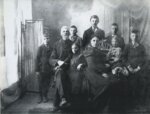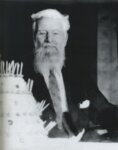


Brigham Buswell, the grandfather of 100-year-old Toledo resident Don Buswell, wrote about fighting in the Civil War and his incarceration at a hospital for wounded prisoners of war.
On July 1, 1862, Brigham fought in the Battle of Malvern Hill in Virginia, the last of the Seven Days Battles, with gunboats on the James River offering protection. They retreated to a 20-foot-high hill from a charge across an open field by part of Confederate John Bankhead Magruder’s Corps, which numbered 10,000.
Brigham volunteered with 19 others to lie on their bellies on a bare knoll and draw the attention of the Confederate sharpshooters so they could be picked off. Brigham rose to his feet, providing a good target, and fired at a rebel officer. A man beside the fallen officer took aim at Brigham and fired. The bullet pierced his left arm 2 inches below the elbow and grazed his side near his waist, just above the hip. As he reloaded his rifle, Brigham turned to the side, which probably saved his life. Otherwise, the ball would have pierced the center of his body and killed him.
With shells bursting around him, Brigham initially failed to notice his wound.
“I turned around, my rifle falling to the ground, my arm hanging helpless at my side, and said to the boys in the rear (for I was farthest at the front), ‘I have been struck by a piece of shell and my left side is torn open.’ That was the feeling I experienced but such did not prove to be the same.”
The ball struck an artery, and Brigham said he “lost about all the blood I was able to spare.”
A soldier wrapped his arm in an old towel and tied the knot on the artery, twisting a stick around it to tighten it, improvising a tourniquet. As the sun set, Brigham struggled toward the rear, picking his way along roads blocked by baggage, wagons, artillery, horses and mules, some dead and others alive, as well as wounded and dying men. He arrived at a large plantation house near Turkey Creek that served as a hospital. He lay on the floor, joined shortly by a first lieutenant in his company with a leg wound. After midnight, their lieutenant colonel ordered everyone to retreat to Harrison Landing with the Army, warning that any who remained would be captured and taken as prisoners to Richmond.
“I arose, weak and dizzy-headed, and made my way slowly toward the door with the others who were able to walk,” Brigham wrote. “I remember reaching the door. Remember standing in the door, peering into the darkness. Remember hearing the rain pouring down in torrents.”
Everything else remained a blank until the next morning.
He awoke the next morning to the sun shining through curtainless windows. He was in an upper room, lying inside a feather mattress on the floor next to another injured comrade. They looked at each other and burst out laughing.
“Our clothes were covered with what had been fresh blood from head to foot,” Brigham wrote. “I suppose we had rolled in the feathers until completely covered. Now the blood was nearly dry. We were not tarred but blood and feathered and presented a very arousing spectacle indeed.”
They scrambled to their feet, descended the stairs and discovered a granary with wheat, which they boiled. A Confederate surgeon bathed and dressed Brigham’s arm, which was the only medical care he received for more than a month. The wounded Union soldiers, loaded onto baggage wagons, were hauled over rough roads to Richmond, a painful trip with a shattered arm. At Richmond, they were placed among 250 wounded men in an old three-story tobacco warehouse, a part of Libby Prison.
“It seemed to us but a grade higher than a hog pen,” Brigham said. “We were placed as close as we could lie. Nearly every morning, a dead comrade who had passed away during the night would be taken away from one side or the other of my body, their places being filled in by new ones just brought in from the battlefields and hospitals at the front.”
Each morning and evening, they received one piece of white bread cut from the end of a loaf of baker’s bread. Twice a week, guards tossed them a picked-over pail of bones.
“All that were able would scramble and fight for them like a lot of hungry dogs,” Brigham recalled.
A bullet greeted anyone who carelessly stuck his head out the window for fresh air.
Flies and maggots feasted on their festering wounds, which nobody dressed. Prisoners simply poured water over them. Lice crawled over their bodies.
A lead-colored pus flowed from Brigham’s arm, contaminated by remnants of the bullet inside his flesh, which was extracted later.
He used $12 in silver that remained in his pockets after his capture to bribe guards into bringing pies, cookies, condensed milk and other food.
“We remained in this hellhole about three weeks,” he said, adding that it must have been heaven compared with Andersonville.
During the early years of the Civil War, prisoner exchanges were a common practice. In mid-August 1862, Brigham and other wounded soldiers were rolled in cattle cars toward City Point, a landing on the James River, and from there taken aboard a U.S. government transport, the Commodore Vanderbilt, with the stars and stripes flying overhead.
“It is impossible for anyone to realize the joy that we experienced and the shouts that rose to our lips when we saw Old Glory,” Brigham wrote.
The 700 wounded were stripped naked, their clothing tossed overboard, and, without enough clothing to go around, many wore long cotton nightgowns. They were fed sparingly, the food carefully guarded, yet Brigham said three men died overnight from overeating, possibly having broken into the cookhouse. He slept on the bare floor of the upper deck, shivering all night as cold wind blew over his cotton nightgown. When a surgeon predicted an officer lying in a berth wouldn’t last long, he waited and crawled into the dead man’s bloodied bed.
Five days after leaving, they reached New York harbor and traveled 20 miles down the bay to David’s Island off the coast of New Rochelle to a hospital holding 3,000 patients. Doctors dressed Brigham’s wounded arm each morning, feeling around for fragments of bone, which they’d remove using forceps.
After he had healed enough, he was discharged on Jan. 26, 1863, to return home. He lived to be nearly 100, married twice, and fathered 14 children.
Six years after his discharge, he married Annie Eliza Cutter on June 6, 1869. They had seven children, but tragedy plagued the family, as noted in the Arapahoe Pioneer’s July 18, 1884, edition. It reported the deaths of 6-year-old Jeannie Buswell on July 15 and 13-year-old Howard the following day, July 16, with two other children dangerously ill.
A doctor initially attributed the two children’s deaths in July 1884 to poisoning caused by eating tainted canned tomatoes, but the following week, the newspaper corrected that account, saying an epidemic appeared to be raging through the neighborhood, sickening several other children living nearby. It might have been diphtheria.
“Last year Mr. Buswell lost a young son, and during the winter he was bereft of his wife who left a little babe two weeks old,” the newspaper reported. His wife was 38 when she died shortly after the birth of their son, Arthur.
Two years later, on May 30, 1886, Brigham married Altha Eudora Gore, a Michigan native who was 25 years younger than him. They raised a second family of seven children, including Wallace Buswell, the father of Don Buswell, of Toledo.
Brigham moved to Elma, Washington, where he worked as a pharmacist. He spent his later years in Seattle. He actually outlived his life insurance policy, so at 96, he collected the Mutual Life Insurance Co. policy’s face value of $750.
He was Seattle’s oldest Civil War veteran when he died on July 13, 1942, just shy of his 100th birthday. At the time, he had eight living children — four sons and four daughters — 27 grandchildren, 18 great-grandchildren and seven great-great-grandchildren. He and his wife are buried at the Oddfellows Cemetery in Elma.
•••
Julie McDonald, a personal historian from Toledo, may be reached at memoirs@chaptersoflife.com.